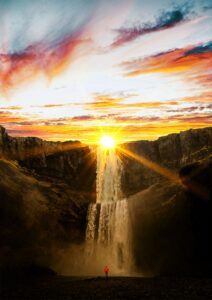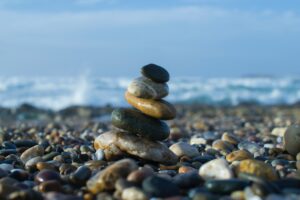Kia hora te marino, kia whakapapapounamu te moana, kia tere te kaarohirohi ki mua i too ara!
May the calm be wide spread, may the waters be smooth like polished greenstone, may the waves scintilate before your path!
So let’s walk.
The practice of finding a stone is the practice of observation. We have found that one cannot “look” for a stone and find it. Instead we observe the environment and there we find that which is different. When we look we expect. We begin to project our hopeful dreams into stones that will never be. What maybe the right mineral maybe fractured. We find it is best to observe and allow that which we hope for to pronounce itself above the others. When we began to fossick as teenagers, all stones came home. Now days we are lucky to find “the one” no matter how small. We don’t know if we have good luck or bad but most (85%) of the stones we have carved have been bought from old time carvers. Reason being, after hours of carving we can’t afford for them to be less than excellent.
When we observe, we let the stones become known to us as they stand out amongst all others. If you look for green to find Greenstone you will most likely find Serpentine. Look for the stone you want to hold onto because you love it! We were reminded the other week ” what do you want to do today?” ” Find an awesome stone”. Wrong answer! “Finish the day with a feeling of satisfaction and gratitude.” Bang on!
The walk is always a spiritual experience for us.
As often as possible we will bring our children. The intention is really to experience nature as a family and to teach our children the magical possibilities we open to as we immerse ourselves in our world. So, we walk and pick up sticks, shells and feathers whilst sharing laughter, song and talk. We know to walk below the steep banks where the tide will turn the stones. We know to search the places where the gravels clatter. We know not to spend all our energy on “looking”. We are here for the experience. We practice observation ( so much less forced than looking). The children have learnt that they can have luck even when walking behind us. No one is exempt from their own luck, their power of observation, their space and time.
The feeling of gratitude when finding a stone is like the earth has gifted us a sign that we are walking the right path, like she loves us and wants for us to be provided for. To watch our babies feel the pride of having good luck and good eyes is a laugh. We try to remind them of humility. ” We don’t find the stone, the stone finds us”. This seems only to make the babies prouder as they (at least for a lucky walk) feel that they are treasure magnets with a destiny to find taonga.
Most of the stones we find aren’t “gem quality”. It doesn’t matter. We don’t walk to become rich in monetary wealth and we only need so many high quality stones.
The “lower grade” stones become a symbol of the understated magic available to us everyday. It’s one thing to find a perfect green or blue but when we find a mostly white one with a burst of bright fuscite green or a black one with a royal blue star of perfect crystals in it we fail to see how that can be any less lucky or special. Isn’t it natural for us to pick up even common stones that are pretty, or feel nice? Our view is that everything is a story connected to our earth that expresses a part of our evolution.
The early morning low tide is our favourite or a day with light rain after a big storm.
“New Days” where the beach has been moved. Some walk far and fast covering a broad area quickly hoping to find a big stone, Mums and dads seem to move slowly observing the cobbles and gravel as we encourage the little ones to stay focused on the intention. Often these smaller stones provide outstanding colour with sizes that range from a single toggle to perhaps 4 carvings.
Go to the beaches and look below the high tide mark. This area is safe and belongs to all.
We agree ” the first stone you find is a gift for someone else”. You don’t have to follow this “rule” but we think it’s a beautiful “rule” to follow. “That stone we found isn’t a stone, it’s our luck, it was our experience and we thought of you, we know you’ll like it. That stone has my happy memories in it, it’s my gift to you, a taonga”. We have the same view about buying a stone for ourselves. We think it’s best to receive it as a gift but have no judgment on those who wish to keep their stone. Truth is that in the old days people killed each other for it (and even less).
Rivers in the region of Ngaai Tahu are out of bounds for most of us. If you are not sure about your right to walk the rivers, you most likely don’t have the right. Still, there are Decendants of Kaati Waewae and Kaati Mahaki who may take you out with them. You will always be better off meeting and getting to know tangata whenua.
Finding a stone is a practice of mindfulness. Finding a stone reminds us how wonderful the world is and that luck is a blessing equally shared by all as are the blisters from long walks in the rain. Sometimes we find a stone we have dreamed of or hoped for, when this happens we feel “on point” like the masters of our destiny who walk in serendipity. We are thankful to live here in a natural state of abundance and we recognise our connection to the spirit. There is enough for all, there is beauty in everything. Let’s share it and share the love.
Good luck then everybody, happy hunting. Don’t forget to pick up rubbish too.
May you feel alive and grateful as you step lightly on the earth knowing that you belong and on the days you open yourself to possibility you will be rewarded.
Naa Rani nui, Naa Papatuanuku, naa wai, naa wai, ko ahau e mihi atu nei.
Tō mauri ora!


